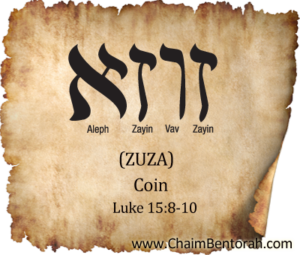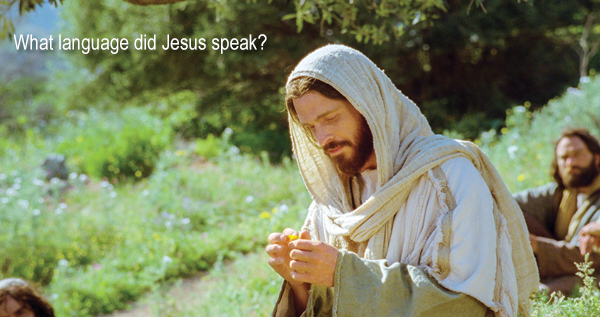Aramaic Word Study – Coin – Zuza זוזא Zayin Vav Zayin Aleph
Luke 15:8-10: “Either what woman having ten pieces of silver, if she loses one piece, doth not light a candle, and sweep the house, and seek diligently till she finds it? (11) And when she hath found it, she calleth her friends and her neighbors together, saying, Rejoice with me; for I have found the piece which I had lost. (12) Likewise, I say unto you, there is joy in the presence of the angels of God over one sinner that repenteth.”
James 4:8: “Draw nigh to God, and he will draw nigh to you. Cleanse your hands, ye sinners; and purify your hearts, ye double-minded.”
 Why do people seek some sort of religion? Ultimately, what they are doing is seeking God. God has put a natural hunger in the human creature to desire to find their creator. My brother and sister-in-law went to Papua New Guinea and enter a village in the jungle to lead those villagers to the Lord and to translate the Bible into their language. One night after having learned their language my brother sat with one of the villagers just looking up in the sky at the stars, the heavens. Suddenly this villager said; “You know, Andy, before you came to our village I prayed to your God and asked him to send us someone to teach us about Him, and then you came.” All over the world in every country, culture and land people have some sort of religion. Even an atheist feels some sort of lack or need that will embrace an ideology to give some meaning to their life. Most, however, will seek to fulfill this need in the supernatural or spiritual realm.
Why do people seek some sort of religion? Ultimately, what they are doing is seeking God. God has put a natural hunger in the human creature to desire to find their creator. My brother and sister-in-law went to Papua New Guinea and enter a village in the jungle to lead those villagers to the Lord and to translate the Bible into their language. One night after having learned their language my brother sat with one of the villagers just looking up in the sky at the stars, the heavens. Suddenly this villager said; “You know, Andy, before you came to our village I prayed to your God and asked him to send us someone to teach us about Him, and then you came.” All over the world in every country, culture and land people have some sort of religion. Even an atheist feels some sort of lack or need that will embrace an ideology to give some meaning to their life. Most, however, will seek to fulfill this need in the supernatural or spiritual realm.
The Bible teaches that if you seek God, He will be found. But note you must seek Him first. You must make the first move toward Him. The word in Hebrew for seek is dresh is an investigation, a search with the intention of not giving up until you found what you were searching for. Jesus told the story of a woman in Luke 15:8-10 who lost a coin and diligently sought to find that coin. In the Aramaic the word for the coin is zuza which corresponds to the Greek word drachma. The zuza was one-tenth a woman’s dowry. She often wore ten zuzas in a crown around her head. It is sort of the origin of our present-day wedding band worn on the finger. To lose one of the coins would be like a woman losing one of the diamonds in her wedding band. There would be many emotions involved in this loss. Perhaps she would feel her husband would think she thought so little of her marriage to him that she would be so careless as to lose one of the coins. Maybe it just holds so much sentimental value that the loss of just one coin would somehow lessen the value of her marriage in her mind. Either way, it would bring a sense of panic and cause that woman to search until she found the coin and then rejoice over its discovery.
Another interesting thing about this story of the lost coin is that the ancient Greek Drachma had a picture of the head of the king on it. So, Jesus was also paralleling the search for one’s king or the King of Kings. The search for one’s King of Kings would be a desperate search.
In James, we learn that if we draw near to God, He will draw near to us. The word for draw near in Greek is engisate which sounds a lot like energy. This expresses an extreme closeness such that you can feel the presence of someone. In the Aramaic it is the word qaruva. This is cognate to the Hebrew word qarav. It means to draw close. In the Aramaic, it has the idea of a close relative. It is also a first-century word for one who leads in prayer. One leading in prayer is drawing others into prayer. Hence God is waiting for you to take the lead. The key to this “drawing near” is the prayer you take, the lead by praying, and when you do you are drawing God near to you.
Why do we have to take the lead? Why can’t God just step up and say; “Well, here I am.” Perhaps Jesus explains that at the end of the story of the lost coin not only did the woman rejoice over finding the lost coin, but heaven rejoices as well. It is like a romance straight out of the Hallmark Channel. Most romance stories involve someone who is searching for love but doesn’t even realize it. Then when it happens something comes up that separates the couple and the person suddenly realizes what he or she has lost and searches in panic for this lost love and when found they both rush into each other’s arms. This love story would not work unless both end up desperately searching for each other.
Jesus gave a clear picture of this from the story of the prodigal son. This story is really based upon an old Jewish tale every mother would tell their child at bedtime. It was about a king who had a son that was rebellious and soon that rebellion lead to the son leaving home to live in another kingdom. After some time the king sent a messenger to his son with the simple message: “Come home!” The son sent the messenger back with this message: “That is just too far for me to come.” The king, this father, returned the messenger with another more direct message: “Then come as far as you can and I will meet you.” The king could have just gone to the other kingdom and taken his son home, but he wanted his son to come willingly not by force. But just an attempt would be all the father needed to come rushing to his son.
How can you draw near to God? You know the routine, prayer, and reading His Word. The point is if you truly desire God then just come to Him as far as you can and He will meet you.
Hi there! Thank you for reading this Daily Word Study. Can I ask a favor? Share this Daily Word Study with your friends on Facebook and Twitter by clicking one of the icons below.
Thanks & Blessings, it means a lot to me!








I just wanted to say thank you greatly for your blog. It has had a profound impact on me and my relationship with God. I don’t have the ability to articulate such feelings in a quick letter of thanks, but your work is immensely precious to me and reaches the deep parts of my heart because of how much it has helped me to understand and grow.
Thank you, keep up the amazing work. Much love and God bless always.
Eternal love story
Precious Precious this context. Quite frankly the opposite opinion of the materialistic doctrine I had to listen to.